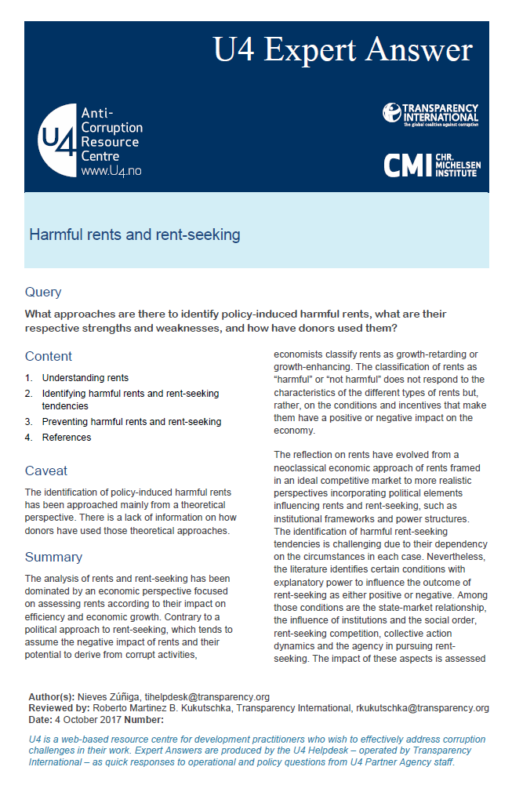
This Anti-Corruption Helpdesk brief was produced in response to a query from a U4 Partner Agency. The U4 Helpdesk is operated by Transparency International in collaboration with the U4 Anti-Corruption Resource Centre based at the Chr. Michelsen Institute.
Query
What approaches are there to identify policy-induced harmful rents, what are their respective strengths and weaknesses, and how have donors used them?
Content
- Understanding rents
- Identifying harmful rents and rent-seeking tendencies
- Preventing harmful rents and rent-seeking
- References
Caveat
The identification of policy-induced harmful rents has been approached mainly from a theoretical perspective. There is a lack of information on how donors have used those theoretical approaches.
Summary
The analysis of rents and rent-seeking has been dominated by an economic perspective focused on assessing rents according to their impact on efficiency and economic growth. Contrary to a political approach to rent-seeking, which tends to assume the negative impact of rents and their potential to derive from corrupt activities, economists classify rents as growth-retarding or growth-enhancing. The classification of rents as “harmful” or “not harmful” does not respond to the characteristics of the different types of rents but, rather, on the conditions and incentives that make them have a positive or negative impact on the economy.
The reflection on rents have evolved from a neoclassical economic approach of rents framed in an ideal competitive market to more realistic perspectives incorporating political elements influencing rents and rent-seeking, such as institutional frameworks and power structures. The identification of harmful rent-seeking tendencies is challenging due to their dependency on the circumstances in each case. Nevertheless, the literature identifies certain conditions with explanatory power to influence the outcome of rent-seeking as either positive or negative. Among those conditions are the state-market relationship, the influence of institutions and the social order, rent-seeking competition, collective action dynamics and the agency in pursuing rent-seeking. The impact of these aspects is assessed in relation to the level of rent-seeking cost and to the value of the rent-outcome resulting from rent-seeking expenditure.
An increasing acknowledgment of the presence of rents in every economic and political system is leading the reflection on rents and rent-seeking towards the question of how to manage rents to ensure they have a positive impact. Conditions, such as a political context free from political constraints and government capabilities like their learning and policy experimentation capacity, are among the considered necessary aspects for successful rent management. The transformation of the relationship between the public and the private sectors towards collaboration, mutual learning and accountability through tools such as integrity pacts is crucial in this regard.
Authors
Nieves Zúñiga, [email protected]
Reviewer
Roberto Martinez B. Kukutschka, Transparency International, [email protected]
Date
05/04/2018
Tags
 Download PDF
Download PDF
